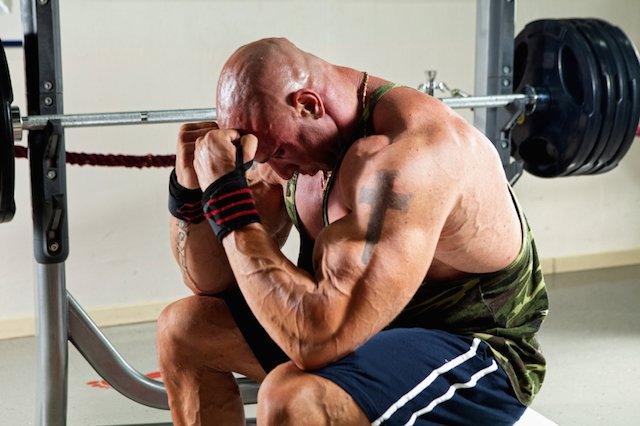

Accelerate Muscle Growth While You Sleep
Table of Contents
Sleep Your Way to New Muscle Mass
Sleep is one of the most neglected aspects of health for most athletes. Not getting a good night’s sleep can not only affect performance but it can also impact your gains in the gym. Studies in volunteers who slept short versus long hours show that sleep reduction was accompanied by increased hunger, higher circulating concentrations of the appetite-stimulating hormone, ghrelin, and reduced concentrations of the anorexigenic hormone, leptin. To determine whether sleep restriction attenuates the effects of a reduced-calorie diet on excess adiposity, researchers had subjects follow a similar diet but differed the duration of sleep. One group slept 8½ hours per night while the other group slept 5½ hours. Sleep curtailment decreased the fraction of weight lost of fat by 55%and increased the loss of fat-free body mass by 60%. In summary, dieting adults getting 5½ hours of sleep produced a catabolic state characterized by reduced loss of body fat and increased loss of fat-free body mass, accompanied by increased hunger and changes in energy expenditure and the neuroendocrine control of substrate utilization. The findings should make bodybuilders aware that cutting back on sleep while dieting can not only cause a catabolic state but can also hinder fat-loss gains.
In this month’s prestigious journal of Obesity, researchers reported that sleep loss can result in reduced metabolic rate. Short sleep duration is a significant risk factor for weight gain. Researchers wanted to examine the impact of losing sleep and its effect on metabolism. Healthy adults participated in a controlled laboratory study. After two baseline sleep nights, subjects were randomized to an experimental:
- 4 hours a sleep per night for five nights followed by one night with 12 h recovery sleep) or control condition (10 hours sleep/ per night). Resting metabolic rate and respiratory quotient were measured using indirect calorimetry in the morning after overnight fasting.
Resting metabolic rate—the largest component of energy expenditure—decreased after sleep restriction (−2.6%) and returned to baseline levels after recovery sleep. Sleep restriction decreased morning resting metabolic rate in healthy adults, suggesting that sleep loss leads to metabolic changes aimed at conserving energy. Sleep is one of the most neglected aspects of dieting, but missing out on sleep may not only make you tired but will blunt your fat loss.
Are you Sleeping enough for Optimal Testosterone Production?
Not making the kind of gains you want in the gym? Your diet and training maybe flawless but there is one variable that may be missing: sleep. Two studies have recently correlated resting testosterone with amount of sleep in men. Researchers have speculated that the use of the internet at night, late night television, and sleeping with your cell phone that goes off all night long can compromise normal sleep rhythms of many young men. Many Americans are sleeping less than the recommended 8 hours per night; interestingly sleep also decreases with age. Plasma testosterone levels vary in a circadian manner, higher on waking and decreasing to a low point at the end of the day. Superimposed on this are burst‑like increases in testosterone production that occur every 90 min or so. Plasma testosterone levels begin to increase with the onset of sleep, and in young men peak at the first REM sleep episode and remaining at that level until waking; the longer the REM sleep latency the slower the rise in testosterone. More recently it has become clear that the production of testosterone is dependent on sleep generally reaching the peak during the first 3 h of uninterrupted sleep, and at least in young men at about the time of the first REM episode. Total fragmentation of normal sleep architecture throughout the night prevents the increase in testosterone. It has also been shown, at least in young men, that the sleep‑dependent increase in testosterone occurs irrespective of whether the sleep occurs at night or for an equivalent duration during the day. The increase in testosterone with sleep time and a decrease during time awake is stable within an individual, but in turn there are large individual differences. Testosterone is not subject to circadian variation in the same way that cortisol. There is sleep‑dependent increase in testosterone that requires 3 hours of slow wave sleep or perhaps a bit longer with increasing age. Testosterone remains elevated for the duration of sleep. The subsequent decrease in testosterone depends on the duration of wakefulness; decreasing more with prolonged wakefulness. Based on several studies, sleep has more of an impact on testosterone levels than previously thought.
Muscle Mass
Researchers from China collected the blood from 531 Asian males between the ages of 29 and 70. Researchers collected questionnaires and sleep habits of the men as well. The researchers found that many men above age 50 years of age were sleeping less than 6 hours a night compared to men in their 40’s. The researchers found that the less men slept, the lower their serum testosterone tended to be. There was a direct correlation between sleep and testosterone levels; this finding was independent of age, total body fat, and exercise intensity. It was previously reported that men who slept between 4-6 hours had lower testosterone levels than man who slept more than 8 hours. In this study, the relationship between sleep loss and testosterone and free testosterone (bioavailable testosterone) were lower in men who slept for between 4 – 6 hours than those who slept more than 6 hours give credence to the suggestion that man who sleep less than 6 hours a night have lower testosterone and free testosterone than those who sleep more than 6 hours. An adequate nightly sleep is a key component of man’s recuperation process following a day’s work. This recuperation process is the engine for the regeneration of alertness required for optimal cognitive and physical functional capacities. The current study mentioned was the observation that total testosterone and bioavailable testosterone were highest in men who slept between 6h to 8h or more gives my support to an earlier study that the optimal sleep duration is about 8h. Some athletes may only sleep 6 hours a night, but based on the current study men who slept less than 6 hours of sleep had less serum testosterone production than the men who slept 8 hours of sleep a night.
Andrea M. Spaeth, David F. Dinges, and Namni Goel. Resting metabolic rate varies by race and by sleep duration. Obesity. Volume 23, Issue 12, pages 2349–2356, December 2015
Goh VHH, Tong TYY, Mok HPP, Said B. Interactions among age, adiposity, bodyweight, lifestyle factors and sex steroid hormones in healthy Singaporean Chinese men. Asian J Androl. 2007; 9:611-621.
Ponholzer A, Plas E, Schatzl G, Struhal G, Brossner C, Mock K, Rauchenwald M, Madersbacher S. Relationship between testosterone serum levels and lifestyle in aging men. Aging Male 2005; 8(3-4):190-193.
Harrison Y, Horne JA. Should we be taking more sleep? Sleep 1995; 18(10): 901–907.
Penev PD. Association between sleep and morning testosterone levels in older men. Sleep 2007; 30(4):427-432.
Opstad PK. Androgenic hormones during prolonged physical stress, sleep and energy deficiency. J Clin Endocrinol Metab. 1992; 74(5):1176-1183.
Belenky G, Wesensten NJ, Thorne DR, Thomas ML, Sing HC, Redmond DP, Russo MB, Balkin TJ. 2003 Patterns of performance degradation and restoration during sleep restriction and subsequent recovery: a sleep dose-response study. J Sleep Res. 2003; 12(1):1-12.
Goh VH, Tong TY. Sleep, Sex Steroid Hormones, Sexual Activities, and Aging in Asian Men. J Androl. 2009.
Luboshitzky R, Shen-Orr Z, Herer P. Middle aged men secrete less testosterone at night than young healthy men. J Clin Endocrinol Metab 2003; 88: 3160–6.
Luboshitzky R, Aviv A, Hefetz A, Herer P, Shen-Orr Z, et al Decreased pituitary gonadal secretion in men with obstructive sleep apnea. J Clin Endocrinol Metab 2002; 87: 3394–8.
Luboshitzky R, Herer P, Levi M, Shen- Orr Z, Lavie P. Relationship between rapid eye movement sleep and testosterone secretion in normal men. J Androl 1999; 20: 731–7.
Luboshitzky R, Zabari Z, Shen-Orr Z, Herer P, Lavie P. Disruption of the nocturnal testosterone rhythm by sleep fragmentation in normal men. J Clin Endocrinol Metab 2001; 86: 1134–9.
Miyatake A, Morimoto Y, Oishi T, Hanasaki N, Sugita Y, et a. Circadian rhythm of serum testosterone and its relation to sleep: comparison with the variation in serum luteinizing hormone, prolactin, and cortisol in normal men. J Clin Endocrinol Metab 1980; 51: 1365–71.
Axelsson J, Ingre M, Akerstedt T, Holmback U. Effects of acutely displaced sleep on testosterone. J Clin Endocrinol Metab 2005; 90: 4530–5.
MUSCLE MEDIA MAGAZINE FOR MEN
The premier source of training, nutrition, supplements, fat loss and health for men.

















